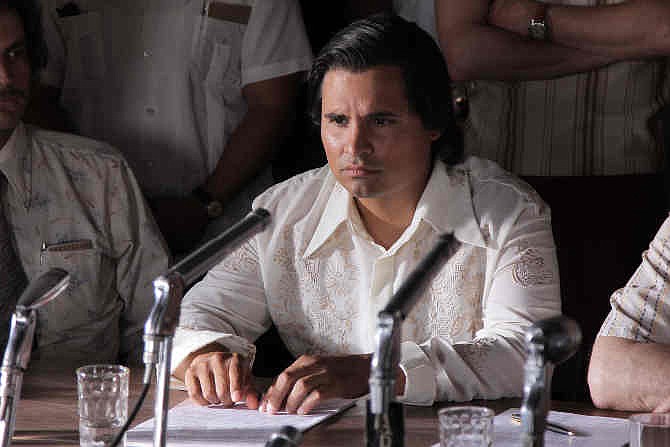LOS ANGELES (AP) - Diego Luna's heartfelt biographical drama, "Cesar Chavez," chronicles the five-year struggle of the United Farm Workers co-founder in the 1960s to get California grape growers to the negotiating table to hammer out fair wages and better conditions for exploited field laborers. It's a stirring story of a real-life fight for social justice, and clearly a passion project for the Mexican actor-turned-director. But while the film's old-fashioned virtues and the integrity of its subject matter give it some traction, pedestrian handling, a lumpy script and some significant miscasting mean it only occasionally summons the dramatic power to match the events it depicts.
Chavez's later life, in particular his widely publicized 1988 hunger strike to protest the use of cancer-causing pesticides on grape crops, is the subject of the feature documentary "Cesar's Last Fast." This poorly organized screenplay by Keir Pearson ("Hotel Rwanda") and Timothy J. Sexton (a co-writer of Alfonso Cuaron's remarkable "Children of Men") concentrates on his earlier years.
Having gained experience in labor issues with the Latino civil rights group Community Service Organization, Cesar (Michael Pena) returns in 1962 to Central California, where he had worked in the fields from age 11 after his family lost their Arizona ranch in the Depression. Together with Dolores Huerta (Rosario Dawson) he founds what is to become the UFW, first joining Filipino-American farm workers in their strike against the Delano grape growers, and then leading a historic march to Sacramento for the same cause. They also instigate a boycott of table grapes that attracts national attention, receiving political support from Robert F. Kennedy.
In much the same way Chavez sent activists out to tell real stories of injustice that would put a human face on their struggle, the screenwriters attempt to get a personal handle on their subject. Together with his feisty wife, Helen (America Ferrera), Cesar gets out in the fields to gather information and muster support. In the face of unyielding resistance from the growers, victimization from police and unrest from within the burgeoning workers movement, Cesar's focus is entirely on the fight, to the exclusion of his large family.
This is a considerably more ambitious undertaking than Luna's 2010 directing debut, the family drama "Abel," but he lacks the command to bring much sweep or momentum to the account. He gets no help from a choppy screenplay that lurches through intimate scenes, agitated meetings and violent clashes with the same by-the-numbers approach, never solidifying the narrative arc or pausing long enough for character development.
This is a problem especially with Cesar, and Pena fails to make much of an impression in the saintly role. While the actor has shown that he can work well in the right part (the ill-fated cop in "End of Watch," or the fake Arab investor in "American Hustle," for instance), he remains a stolid presence here. He spouts sound bites rather than creating a shaded portrait of someone we have to assume was a deeply impassioned and by most accounts spiritual man. He simply doesn't come across as a sufficiently charismatic or persuasive leader to galvanize vast numbers of frightened workers to demand their rights.
Dawson has nothing to play beyond standing around looking concerned and combative. Only Ferrera comes close to sketching a real character as self-possessed Helen, who is supportive of her husband's endeavors but also forthright about her own views on how the struggle should proceed.
There's not a lot of subtlety on the bad-guy side. Michael Cudlitz seems a poor fit for the racist Delano sheriff, while John Malkovich (who's also a producer) sleepwalks through the movie as the snakiest of the grape growers, who wants to dictate terms rather than negotiate.
Technically, the film is solid if unremarkable and somewhat underpopulated, though it integrates archive footage and photographic material to good effect.
"Cesar Chavez," a Lionsgate release, is rated PG-13 by the Motion Picture Association of America for "some violence and language." Running time: 101 minutes.
Related video:

